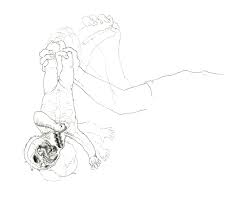FEMALE INFANTICIDE
The phenomenon of female infanticide is as old as many cultures and has likely accounted for millions of gender-selective deaths throughout history. It remains a critical concern in a number of Third world countries today. In all cases specifically female infanticide reflects the low status accorded to women in most parts of the world. It is arguably the most brutal and destructive manifestation of the anti-female bias that pervades "Patriarchal" societies. It is closely linked to the phenomena of sex-selective abortion which targets female fetuses almost exclusively and neglect of girl children. Female Infanticide is the intentional killing of baby girls due to the preference for male babies and from the low value associated with the birth of females.
In nearly 300 poor hamlets of Usilampatti area of Tamilnadu, as many; as 196 girls died under suspicious circumstances in 1993. Some female children were fed dry, unhulled rice that punctured their wind pipes or were made to swallow poisonous powdered fertilizer. Others were smothered with a wet towel, strangled or allowed to starve to death.
Statistics show that there is a still a very high preference for male child in states like Uttar Pradesh, Maharashtra, Madhyaprsdesh, Punjab etc. Infanticide is still prevalent in some villages like Usilampatti, Thiruchengode, Mallasamudram, Kalayampatty, Dhamapuri and Kapilarmalai in Tamilnadu. The Government of Tamilnadu had passed the Pre-Natal Diagnostic Techniques Act in 1994 to prevent Female Infanticide. Both the central and state Governments play an important role in the prevention of Female Infanticide. Section 302 on Indian Penal Code calls infanticide as culpable homicide amounting to murder. The Government of Tamilnadu introduced the Cradle Baby Scheme in 1994. The above scheme was implemented in 1996 and it has paved the way for the establishment of a Cradle Baby Centre in every place where Female Infanticide has been largely practiced. Besides these welfare schemes, the Government wanted to give punishments to those parents who committed female infanticide. Accordingly the Government passed an Act declaring sex determination tests during pregnancy as illegal.
In nearly 300 poor hamlets of Usilampatti area of Tamilnadu, as many; as 196 girls died under suspicious circumstances in 1993. Some female children were fed dry, unhulled rice that punctured their wind pipes or were made to swallow poisonous powdered fertilizer. Others were smothered with a wet towel, strangled or allowed to starve to death.
Statistics show that there is a still a very high preference for male child in states like Uttar Pradesh, Maharashtra, Madhyaprsdesh, Punjab etc. Infanticide is still prevalent in some villages like Usilampatti, Thiruchengode, Mallasamudram, Kalayampatty, Dhamapuri and Kapilarmalai in Tamilnadu. The Government of Tamilnadu had passed the Pre-Natal Diagnostic Techniques Act in 1994 to prevent Female Infanticide. Both the central and state Governments play an important role in the prevention of Female Infanticide. Section 302 on Indian Penal Code calls infanticide as culpable homicide amounting to murder. The Government of Tamilnadu introduced the Cradle Baby Scheme in 1994. The above scheme was implemented in 1996 and it has paved the way for the establishment of a Cradle Baby Centre in every place where Female Infanticide has been largely practiced. Besides these welfare schemes, the Government wanted to give punishments to those parents who committed female infanticide. Accordingly the Government passed an Act declaring sex determination tests during pregnancy as illegal.
